WHEELS of INDUSTRY The wheels of wealth will be stowed
Page 42
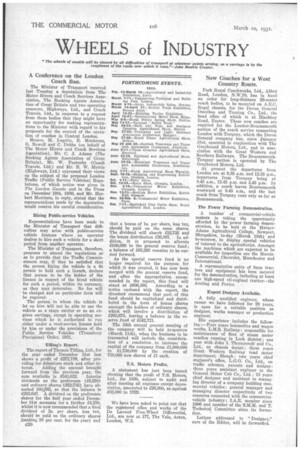
Page 43
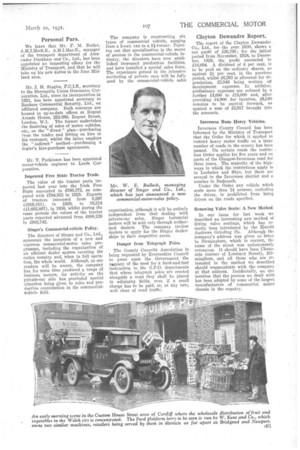
Page 44
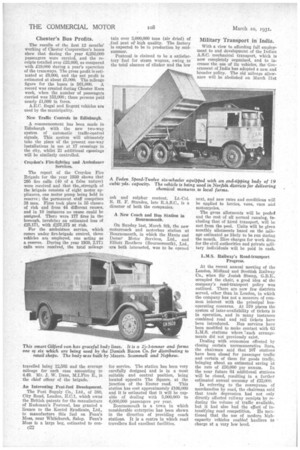
Page 45
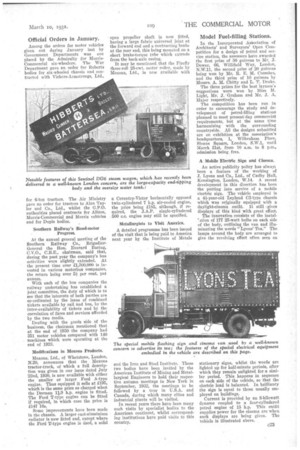
Page 46
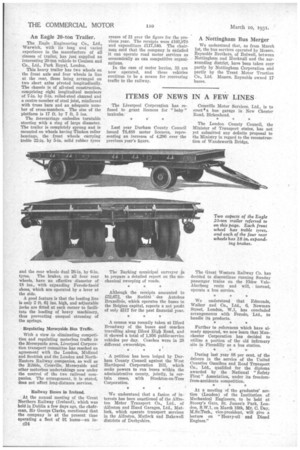
If you've noticed an error in this article please click here to report it so we can fix it.
by all difficulties of transport at whatever points arising, as a carriage is by the
roughness of the roads over which it rans."—John Beattie Crozier.
A Conference on the London Coach Ban.
The Minister of Transport received last Tuesday a deputation from The Motor Hirers and Coach Services Association, The Booking Agents Association of Great Britain and two operating concerns, Highways, Ltd., and Coach Travels, Ltd., in response to a request from these bodies that they might have an opportunity for making representations to the Minister with regard to his proposals for the control of the operation of coaches in Central London.
Messrs. M. Logette, E. Monkman, G. Nowell and C. Dobbs (on behalf of The Motor Hirers and Coach Services Association), Mr. C. J. Adams (The Booking Agents Association of Great Britain), Mr. W. Featonby (Coach Travels, Ltd.) and Mr. E. W. Morris (Highways, Ltd.) expressed their views on the subject of the proposed London Traffic (Public Service Vehicles) Regulations, of which notice was given in The London Gazette and in the Press on December 19th, 1930, and Mr. Herbert Morrison, in reply, stated that the representations made by the deputation would receive his careful consideration.
Hiring Public-service Vehicles.
Representations have been made to the Minister of Transport that difficulties may arise with public-service vehicle licences where an operator desires to hire such a vehicle for a short period from another operator.
The Minister of Transport, therefore, proposes to amend the regulations so as to provide that the Traffic Commissioners may, if they be satisfied that the person hiring the vehicle is a fit person to hold such a licenee, declare that person to be the holder of the licence in respect of the hired vehicle for such a period, within its currency, as they may determine. No fee will be charged and no particular form will be required. The person to whom the vehicle is let on hire will not be able to use the vehicle as a stage carrier or as an express carriage, except in operating services which he is authorized to run either under a road-service licence held by him or under the provisions of the Public Service Vehicles (Transitory Provisions) Order, 1931.
Tilling's Report.
The report of Thomas Tilling, Ltd., for the year ended December 31st last shows a profit of £272,789, after providing for debenture stock and other in terest. Adding the amount brought forward from the previous year, the sum available is £343,632. Interim dividends an the preference (£8,250) and ordinary shares (02,735) have absorbed £60,985, so that the balance is £282,647. A. dividend on the preference shares for the half year ended December 31st accounts for a further £8,250, whilst it is now recommended that a final dividend of 2s. per share, less tax, should be paid on the ordinary shares ,(making 20 per cent. for the year) and that a bonus of 1s. per share, less tax, should be paid on the same shares. The dividend will absorb £52,735 and the bonus distribution £26,367. In addition it is proposed to allocate £100,600 to the general reserve fund ; a balance of £95,295 remains to be carried forward.
' As the special reserve fund is no longer required for the purpose for which it was created, it has now been merged with the general reserve fund, and after the appropriation recommended in the report, this fund will
stand at 1606,396. According to a notice enclosed with the report, the directora recommend that part of this fund should be capitalized and distributed in the form of bonus shares amongst the holders of ordinary shares, which will involve a distribution of 1263,675, leaving a balance in the reserve fund of £342,721.
The 34th annual general meeting of the company Will be held to-morrow (March 11th), when the business to be transacted will include the consideration of a resolution . to increasethe capital of the company from £1,000,000 to £1,750,000 by the creation of 750,000 new shares of £1 each.
T.S. Motors Profits.
A statement has just been issued showing that the profit of T.S. Motors, Ltd., for 1930, subject to audit and after meeting all expenses except depreciation, amounted to £26,000, as against £82,000 in 1929.
We have been asked to point out that the registered office and works of the De Lavaud Free-Wheel Differential, Ltd., are now at 177, The Vale, Acton, London, W.3,
New Coaches for a West Country Route.
Park Royal Coachworks, Ltd., Abbey Road, London, N.W.10, has in hand an order for long-distance 26-seater coach bodies, to be mounted on A.E.C. Regal chassis, for the Devon General Omnibus and Touring Co., Ltd., the head office of which is at Blackboy Road, Exeter. These new coaches are required for the London-Bournemouth section of the coach service connecting London with Torquay, which the Devon General company has, since January 31st, operated in conjunction with The Greyhound Motors, Ltd., and in association with the Great Western and Southern Railways. The BournemouthTorquay section is operated by The Greyhound Motors, Ltd.
At present the departures front London are at 8.35 a.m. and 12.35 p.m„ departures from Torquay being at 8.45 a.m., 12.45 p.m. and 3.45 p.m. In addition, a coach leaves Bournemouth westward at 9.45 a.m., and the last coach from Torquay runs only as far as Bournemouth.
The rower Farming Demonstration.
A number of commercial-vehicle makers is taking the opportunity afforded by the' power farming demonstration, to be held at the HarperAdams Agricultural College, Newport, Shropshire, to-day (March 10th) and to-morrow, to display special vehicles of interest to the agriculturist. Amongst the machines which are expected to be available for inspection are the MorrisCommercial, Chevrolet, Manchester and International.
A representative entry of farm tractors and equipment has been secured for the demonstration, including at least one high-speed oil-engined tractor—the Aveling and Porter.
Expert Designer Available.
A fully qualified engineer, whose career we have followed for 20 years, is open for a suitable position as designer, works manager or production engineer.
His experience includes the following :—Four years locomotive and wagon works, L.M.S. Railway ; responsible for maintenance of fleet of steam motor coaches running in Leek district ; one year with John I. Tlaornycroft and Co., Ltd., on chassis design ; • three years Great Western Railway road motor department, Slough; two years chief engineer's office, L.G.O. Co., Ltd., on traffic schemes, patents and designs; three years assistant engineer to the General Motor Cab Co., Ltd.; 13 years chief designer and assistant to managing director of a company building commercial vehicles ; general manager and managing director respectively of two concerns connected with the commercialvehicle industry; I.A.E. member since 1906 and member of the S.M.M. and T. Technical Committee since its forma tion.
Letters addressed to "Designer," care of the Editor, will be forwarded.
Personal Pars.
We learn that Mr. F. M. Butler, A.M.I.Mech.E., A.M.I.Mar.E., manager of the transport department of Alexander Duckham and Co., Ltd., has been appointed an inspecting officer for the Ministry of Transport, and that he will take up his new duties in the East Midland area.
Mr. J. H. Stagles, F.C.I.S., secretary to the Mercantile Union Guarantee Corporation, Ltd., since its incorporation in 1921, has been appointed secretary to Bankers Commercial Security, Ltd., an affiliated company. Both concerns are housed in up-to-date offices at Regent Arcade House, 262-260, Regent Street, London, W.1. The former undertakes the financing of sales of motor vehicles, etc., on the " direct " plan—purchasing from the trader and letting on hire to his customer, whilst the latter employs the " indirect " method—purchasing a dealer's hire-purchase agreements.
Mr. T. Parkinson has been appointed motor-vehicle engineer to Leeds Corporation.
Improved Free State Tractor Trade The value of the tractor parts imported last year into the Irish Free State amounted to £796,372, as compared with £794,852 in 1929. Exports of tractors increased from 8,597 (£919,151), in 1929, to 16,214 (£1,682,897), in 1930, whilst during the same periods the values of the tractor parts exported advanced from £888,126 to £908,742.
Singer's Commereial-vehicle Policy.
The 'Erectors of Singer and Co., Ltd., announce the inception of a new and vigorous commercial-motor sales programme, including the organization of an efficient dealer system covering the entire country and, when in full operation, the whole world. Although, as our readers will be aware, the company has for some time produced a range of business motors, its activity on the private-car side has precluded special attention being given to sales and production organization in the commercialvehicle field. The company is constructing six types of commercial vehicle, ranging from a 5-cwt. van to a 2i-tonner. Pointing out that specialization is the secret of success in the commercial-vehicle industry, the directors have now established increased production facilities, and have installed a special sales force. The experience gained in the intensive marketing of private cars will be fully used by the commercial-vehicle sales organization, although it will be entirely independent from that dealing with private-car sales. Singer industrial motors will be sold only through authorized dealers. The company invites dealers to apply for the Singer dealerships in their respective areas.
Danger from Telegraph Poles.
The County Councils Association is being requested by Breconshire Council to press upon the Government the uagency of the need for a hard-and-fast instruction to the G.P.O. departments that where telegraph poles are erected alongside a road they shall be placed in adjoining fields, even if a small charge has to be paid, or, at any rate, well clear of road traffic.
Clayton Dewandre Report.
The report of t'he Clayton Dewandre Co., Ltd., for the year 1930, shows a net profit of £26,195; for the initial period from November, 1928. to December, 1929, the profit amounted to £16,694. A dividend of 4 per cent, is to be paid on the-ordinary shares, as against 2i per cent, in the previous period, whilst £6,293 is allocated for depreciation, £2,946 being written off development expenses. In additior, preliminary expenses are reduced by a further £4,000 to £18,090 and, after providing £4,900 for' taxation, £6,549 remains th be carried forward, as against a sum of £3,917 brought into the accounts.
Inverness Bans Heavy Vehicles.
Inverness County Council has been informed by the Ministry of Transport that the Order for which it applied to restrict heavy motor traffic on a large number of roads in the county has been passed. On certain roads the restriction Order applies for five years and on parts of the Glasgow-Inverness road for three years. The majority of the highways to which the restrictions apply is in Loehaber and 8k-ye, but there are several in the Inverness district and a number in Badenoch.
Under the Order any vehicle which seats more than 14 persons, excluding the driver, is prohibited from being driven on the roads specified.
Renewing Valve Seats: A New Method.
In our issue for last week we described an interesting new method of fitting valve seatings, which has recently been introduced by the Harold Andrews Grinding Co. Although. the company's address was given as being in Birmingham, which is correct, the name of the street was unfortunately erroneous. It should have been Cheapside (corner of Lombard Street), Birmingham, and all those who are interested in the method we described should communicate with the company at that address. Incidentally, we can mention that the process we dealt with has been adopted by some of the largest manufacturers of commercial motor chassis in the country.
Chester's Bus Profits.
The results of the first 12 mouths' working of Chester Corporation's buses show that during the year 6,250,000 passengers were carried, and the receipts totalled over £33,000, as compared with .£19,000 during a year's operation of the tramways. The gross profit is estimated at £2,000, and the net profit is estimated at about £5,000. The mileage figure for the buses is 561,000. A record was created during Chester Race week, when the number of passengers carried was 153,000; these persons paid nearly £1,000 in fares.
A.E.C. Regal and Regent vehicles are used by the municipality.
New Traffic Controls in Edinburgh.
A commencement has been made in Edinburgh with the new two-way system of automatic traffic-control signals. This system will ultimately take the place of the present one-way installations in use at 17 crossings in the city, whilst 21 additional ciossings will be similarly controlled.
Croydon's Fire-fighting and Ambulance Services.
The report of the Croyden Fire Brigade for the year 1930 shows that 295 fire calls (40 of a false nature) were received and that the strength of the brigade consists of eight motor appliances, one motor pump being held in reserve ; the permanent staff comprises 38 men. Fires took place in 55 classes of risk and from 44 different causes, and in 10 instances no cause could be assigned. There were 177 fires in the borough, involving an estimated loss of £25,171, with £251,375 at risk.
For the ambulance service, which comes under fire-brigade control, three vehicles are employed, one acting as a reserve. During the year 1930, 2,773 calls were received, the total mileage travelled being 12,505 and the average mileage for each case amounting to 4.49. Mr. 3. W. Dane, M.I.Pire E., is the chief officer of the brigade.
An Interesting Peat-fuel Development.
The Peat Supply Co., Ltd., of 380, City Road, London, E.C.1, which owns the British patents for the manufacture of Rudeman's Peatcoal, has granted a licence to the Kentol Syndicate, Ltd., to manufacture this fuel on Fenn's Moss, near Whitchurch, Salop. Fenn's Moss is a large bog, estimated to con c22 tam n over 3,000,000 tons (air dried) of fuel peat of high quality. The factory is expected to be in production by midsummer.
Peatcoal is claimed to be a satisfactory fuel for steam wagons, owing to the total absence of clinker and the low ash and sulphur content. Lt.-Col. R. E. F. Standen, late R.A.S.C., is a director of both the companies.
A New Coach and Bus Station in Bournemouth.
On Sunday last, March 8th, the new motorcoach and motorbus station at Bournemouth, in which the Hants and Dorset Motor Services, Ltd., and Elliott Brothers (Bournemouth), Ltd., are both interested, was to be opened for service. The station has been very carefully designed and is in a most suitable and central position, being located opposite The Square, at the junction of the Exeter road. This station has cost approximately f100,000 and it is estimated that it will be capable of dealing with 5,000,000 to 6,000,000 passengers per year. Bournemouth is a town in which considerable enterprise has been shown in the direction of providing coach stations. It is a centre in which road travellers find excellent facilities.
March lo, 1931. Military Transport in India.
With a view to affording full_ employment to and development of the Indian A.S.C. mechanical transport, which is now completely organized, and to increase the use of its vehicles, the Government of India has adopted a new. and broader policy. The old mileage allowance will be abolished on March 31st next, and new rates and conditions will be applied to lorries, vans, cars and motorcycles.
The gross allotments will be pooled and the cost of all normal running, Including that of hired transport, will be met from the pool. Units will be given monthly allotments based on the mileage estimated as likely to be run during the month. Hire charges for work done for the civil authorities and private military individuals will be paid in cash.
L.M.S. Railway's Road-transport Progress.
At the recent annual meeting of the London, Midland and Scottish Railway Co., when Sir Josiah Stamp, G.B.E., occupied the chair, a good idea of the company's read-transport policy was outlined. There are now few districts served, other than in London, in which the company has not a measure of common interest with the principal busoperating concerns. At 570 places the system of inter-availability of tickets is in operation, and in many instances combined road and rail tickets have been introduced. Bus services have been modified to make contact with 63 L.M.S. stations where such arrangements did not previously exist.
Dealing with economies effected by closing certain unremunerative lines, the chairman said that 107 stations have been closed for passenger traffic and certain of them for goods traffic, bringing about an estimated saving at the rate of £50,000 per annum. In the near future 64 additional stations will be closed, resulting in a further estimated annual economy of £22,000.
In referring to the conveyance of merchandise by road, the chairman said that trade depression had not only directly affected railway receipts by reducing the volume of traffic available, but it had also had the effect of intensifying road competition. He mentioned that the use of modern highcapacity vehicles enabled hauliers to charge at a very low level.
Official Orders in January.
Among the orders for motor vehicles given out during January last by Government Departments was one placed by the Admiralty for MorrisCommercial six-wheelers. The War Department gave an order for Roberts bodies for six-wheeled chassis and contracted with Vickers-Areastrongs, Ltd., for 6-ton tractors. The Air Ministry gave an order for tractors to Alan Taylor and Co., Ltd., whilst the G.P.O. authorities placed contracts for Albion, Morris-Commercial and Morris vehicles and for Duple bodies.
Southern Railway's -Road-motor Progress.
At the annual general meeting of the Southern Railway Co., BrigadierGeneral the Bon. Everard Baring, C.V.O., C.B_E., chairman, said that, during the past year the company's bus activities were slightly extended. At the present time over £1,300,000 is invested in various motorbus companies, the return beihg over 5i per cent, per annum.
With each of the bus companies the railway undertaking has established a joint committee, the duty of which is to see that the interests of both parties are co-ordinated by the issue of combined tickets available by rail and bus, by the inter-availability of tickets and by the correlation of fares and services afforded by the two media.
Dealing with the goods side of the business, the chairman mentioned that at the end of 1930 the company had 351 motor vehicles compared with 140 machines which were operating at the end of 1923.
Modifications in Moxons Products.
Moxons, Ltd., of Whetstone, London, N.20, announces that the Moxons tractor-truck, of which a full description was given in our issue dated July 1930, is now available with either the smaller or larger Ford A-type engine. Thus equipped it sells at £195, which is the same price as charged when the Dorman 11.9 h.p. engine is fitted. The Ford T-type engine can be fitted if required, in which case the price is £147 10s.
Some improvements have been made in the chassis. A larger cast-aluminium radiator is now fitted and, except where the Ford T-type engine is Used, a solid open propeller shaft is now fitted, having a large fabric universal joint at the forward end and a contracting brake at the rear end, this being mounted on a short brake-torque tube which extends from the back-axle casing.
It may be mentioned that the Firefly three-roll 25-cwt. motor roller, made by Moxons, Ltd., is now available with a Coventry-Victor horizontally opposed twin-cylindered 7 h.p. air-cooled engine, the price being £185, although, if required, the J.A.P. single-cylindered 500 c.c. engine may still be specified.
Metallurgists to Visit America.
A detailed programme has been issued of the visit that is being paid to America next year by the Institute of Metals and the Iron and Steel Institute. These two bodies have been invited by the American Institute of Mining and Metallurgical Engineers to hold their respective autumn meetings in New York in September, 1932, the meetings to be followed by a tour in U.S.A. and Canada, during which many cities and industrial plants will be visited.
In recent years there have been many such visits by specialist bodies to the American continent, whilst corresponding institutions have paid visits to this country.
Model Fuel-filling Stations.
In the Incorporated Association of Architects' and Surveyors' Open Competition for a design of petrol and service station, the assessors have awarded the first prize of 50 guineas to Mr. J. Dower, 66, WillifieId Way, London, N.W.11, the second prize of 20 guineas being won by Mr. R. E. M. Coombes, and the third prize of 10 guineas by Messrs. A. M. Chitty and L. T. Drake.
The three prizes for the best laymen's suggestions were won by Miss M. Light, Mr. J. Graham and Mr. J. A, Maj or respectively.
The competition has been run in order to encourage the study and development of petrol-filling stations planned to meet present-day commercial requirements, but at the same time harmonizing with the surrounding countryside. All the designs submitted are on exhibition at the association's headquarters, 1, Wilbraham Place, Sloane Square, London, SAVA, until March 31st, from 10 a.m. to 8 p.m., admission being free.
A Mobile Eleeteic Sign and Cinema.
An active publicity policy has alwayi been a feature of the working of .1. Lyons and Co., Ltd., of Cadby Hall, Kensington, London, W.14. A recent development in this direction has been the putting into service of a mobile electric sign. The vehicle employed is a 4i-year-old Deyland C3-type chassis which was originally equipped with a daylight-cinema outfit. It still gives displays of this kind with great effect. The innovation consists of the instal"ation of 177 25-watt bulbs on each side of the body, outlining the van and illuminating the words "Lyons' Tea." The lamps around the body are arranged to give the revolving effect often seen on stationary signs, whilst the words are lighted up for half-minute periods, after which they remain unlighted for ‘a similar period. This happens in sequence on each side of the vehicle, so that the electric load is balanced. In brilliancy the sign is equal to those usually employed on buildings.
Current is provided by an 8-kilowatt dynamo coupled to a four-cylindered petrol engine of 15 h.p. This outfit supplies power for the cinema arc when such displays are being given. The vehicle is illustrated above. An Eagle 20-ton Trailer.
The Eagle Engineering Co., Ltd., Warwick, with its long and varied experience in the manufacture of all classes of trailer, has just supplied an interesting 20-ton vehicle to Coulson and Co., Ltd., Park Royal, London,
This heavy trailer has two wheels on the front axle and four wheels in line at the rear, these being arranged on two short axles pivoted longitudinally. The chassis is of all-steel construction, comprising eight longitudinal members of 7-in. by 3-in. rolled-steel channel and a centre member of steel joist, reinforced with truss bars and an adequate number of cross-members. The size of the platform is 17 ft. by 7 ft. 3 ins.
The forecarriage embodies turntable steering with a ring of large diameter. The trailer is completely sprung and is mounted on wheels having Timken roller bearings, the front wheels carrying treble 22-in. by 5-in, solid rubber tyres and the rear wheels dual 26-in. by 6-in.
tyres. The brakes, on all four rear wheels, have an effective diameter of 18 ins., with expanding Ferodo-faced shoes, which are operated by a lever at the side.
A good feature is that the loading line is only 2 ft. 61 ins, high, and adjustable jacks are fitted at each corner to facilitate the loading of heavy machinery, thus preventing unequal stressing of the springs.
Regulating Merseyside Bus Traffic.
With a view to eliminating competition and regulating motorbus traffic in the Merseyside area, Liverpool Corporation transport committee has reached an agreement with the London, Midland and Scottish and the London and NorthEastern Railway companies, as well as the Ribble, Crosville, Merseyside and other motorbus undertakings now under the control of the two railroad companies. The arrangement, it is stated, does not affect long-distance services.
Railway Buses in Ireland.
At the annual meeting of the Great Northern Railway (Ireland), which was held in Dublin a few days ago, the chairman, Sir George Clarke, mentioned that the company is at the present time operating a fleet of 91 buses—an in. crease of 31 over the figure for the previous year. The receipts were 1103,970 and expenditure £117,340. The chairman said that the company is satisfied it can operate road motor services as economically as can competitive organizations.
In the case of motor lorries, 33 are now operated, and these vehicles continue to be a means for recovering traffic to the railway.
March io, 1931. A Nottingham Bus Merger
We understand that, as from March let, the bus services operated by Messrs. Reynolds Brothers, of Bulwell, between Nottingham and Hucknall and the surrounding district, have been taken over partly by Nottingham Corporation aid partly by the Trent Motor Traction Co., Ltd. Messrs. Reynolds owned 17' buses.












































































































